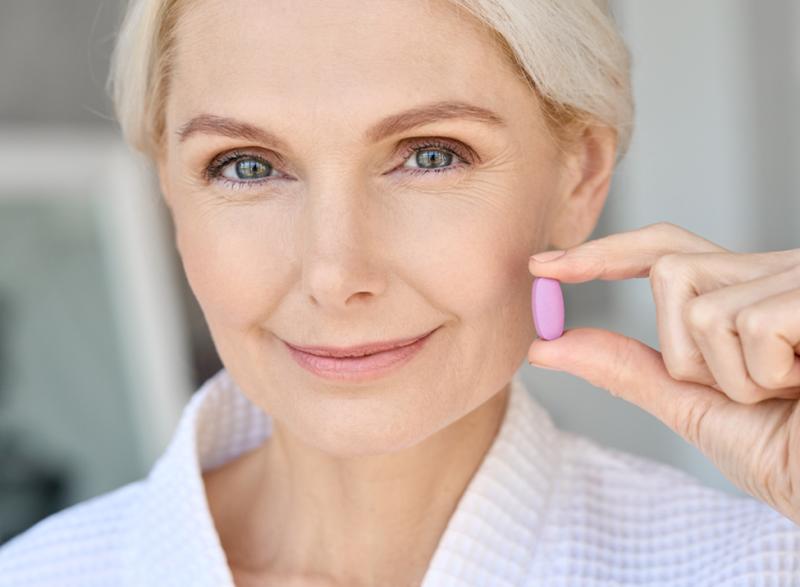7 Anti-Aging Skincare Tips for Menopausal Women

Source: Jacob Lund/Shutterstock.com
Menopause is a natural biological process that marks the end of a woman's reproductive years. While it's a normal transition that happens to all women, it can bring about hormonal imbalance symptoms in women, affecting various aspects of their health, including their skin. To help you transition through this natural period in life feeling and looking radiant, we've compiled seven anti-aging skincare tips for menopausal women to help you look and feel your best.
Why Menopausal Women Experience Skincare Issues
During menopause, hormonal changes can affect the skin in numerous ways. The most significant impact is on collagen production, which decreases significantly during menopause. Collagen is a protein that gives the skin elasticity and firmness, and its decline results in wrinkles, fine lines, and sagging skin.
Estrogen is the hormone responsible for maintaining healthy levels of collagen production. However, during menopause, estrogen levels drop drastically, leading to a reduction in collagen synthesis. This decrease causes the skin to become thinner and more fragile over time.
Another common issue experienced by menopausal women is dryness of the skin. This happens because sebaceous gland activity decreases due to hormonal changes. As a result, the skin produces less oil than before, leading to dryness and itchiness. In addition to this, the skin also becomes more sensitive as it thins out over time.
Overall, menopausal women need to pay extra attention to their skincare routine during this phase of life. By understanding these underlying issues caused by hormonal changes during menopause, they can take steps toward maintaining healthy and youthful-looking skin for years to come.
1) Protect Your Skin from the Sun
One of the most important things you can do to maintain healthy and youthful-looking skin during menopause is to protect it from the sun. Sun damage is one of the leading causes of premature aging, and menopausal women are especially susceptible to its effects.
To protect your skin from the sun, wearing sunscreen with a minimum SPF of 30 every day is crucial. It's also important to reapply sunscreen throughout the day, especially if you're spending time outdoors or in direct sunlight. If you don't want to add another step to your skincare routine, consider using products that already contain SPF.
In addition to sunscreen, wearing protective clothing like hats and long-sleeved shirts can also help shield your skin from harmful UV rays. By taking these simple steps, you'll be able to protect your skin from sun damage and maintain a healthy and youthful appearance for years to come.
2) Moisturize, Moisturize, Moisturize
Moisturizing is essential in any skincare routine, but it's especially important for menopausal women. As we age, our skin loses its ability to retain moisture, leading to dryness, fine lines, and wrinkles.
It's important to note that there's a difference between hydration and moisturizing. Hydration refers to the amount of water in your skin, while moisturizing refers to the oils that help lock that water in. However, both are vital for maintaining healthy and youthful-looking skin.
When it comes to moisturizers, choosing one that's appropriate for your skin type is important. Oily skin types should opt for lightweight or oil-free formulas, while those with dry skin should look for thicker creams or balms. Don't forget about eye cream! The delicate skin around the eyes needs extra moisture and attention.
To apply moisturizer effectively, clean your face thoroughly and pat dry with a towel. Then, take a pea-sized amount of moisturizer and gently massage it into your face using upward circular motions. Pay extra attention to areas prone to dryness, like the cheeks and forehead. Finally, don't forget about your neck. It deserves some love, too!
3) Use Retinoids to Reduce Wrinkles and Fine Lines
Retinoids are a type of vitamin A that has been shown to be effective in reducing wrinkles and fine lines. They work by increasing cell turnover, which helps to stimulate collagen production and improve skin texture.
While retinoids can be incredibly effective, they can also have potential side effects. Some people may experience redness, irritation, or flakiness when first using retinoids. To minimize these side effects, start by using a low-concentration formula and gradually work your way up. It's also important to apply retinoids at night and wear sunscreen during the day, as they can make your skin more sensitive to the sun.
Overall, retinoids can be a powerful tool in the fight against aging skin. If you want to incorporate them into your skincare routine, talk to your dermatologist about which product is right for you.
4) Incorporate Antioxidants into Your Skincare Routine
Antioxidants are a powerful tool in the fight against aging skin. They work by neutralizing free radicals, which are molecules that can damage our skin cells and lead to wrinkles, fine lines, and other signs of aging.
Many different types of antioxidants can benefit your skin, including vitamin C, vitamin E, and green tea extract. These ingredients can help to brighten the complexion, reduce inflammation, and improve overall skin health.
To incorporate antioxidants into your skincare routine, look for products that contain these ingredients. This could include serums, moisturizers, or even facial mists. You could also consider adding antioxidant-rich foods to your diet, such as berries or leafy greens.
5) Take Collagen Supplements
Collagen is a protein that plays an important role in maintaining youthful-looking skin. It helps to keep our skin firm and elastic, which can help to reduce the appearance of wrinkles and fine lines.
Many types of collagen supplements are available on the market, including powders, capsules, and drinks. These supplements are designed to provide your body with the amino acids it needs to produce collagen naturally.

Source: Ground Picture/Shutterstock.com
To get the best results from collagen supplements, following the directions on the supplement being used is important. Most supplements recommend taking a specific amount daily for several weeks or months to see noticeable results.
While collagen supplements can be effective for some people, it's also important to remember that they may not work for everyone. If you're interested in trying collagen supplements, talk to your doctor or dermatologist first to determine if they're right for you.
6) Try FAR Infrared (FIR) Therapy
FAR infrared (FIR) therapy is a type of heat therapy that can benefit the skin. It works by using far-infrared light to penetrate deep into the skin, which can help to improve circulation and promote collagen production.
There are different ways to experience FIR therapy, including using an at-home device or visiting a spa that offers this type of treatment. At-home devices can include sauna blankets or mats that emit FIR light, while spa treatments may involve sitting in an FIR sauna. It's important to note that these at-home options are not appropriate for your face but rather meant for treating other parts of your body. For safety, you should never cover your face with an infrared sauna blanket or mat.
In addition to its potential benefits for the skin, FIR therapy has also been shown to help with pain relief and relaxation. However, it's important to talk to your doctor before trying FIR therapy if you have any underlying health conditions or concerns.
If you're interested in trying FIR therapy for your skin, consider talking to a skincare professional about the best way to incorporate it into your routine.
7) Consider Bioidentical Hormone Replacement Therapy (BHRT)
Bioidentical hormone replacement therapy (BHRT) is a treatment option that can benefit menopausal women's skin. It involves using hormones that are identical in structure to those produced by the body, which can help to balance hormone levels and reduce common symptoms of menopause like dryness, thinning skin, and wrinkles.
The benefits of hormone replacement therapy for the skin can be significant, including improved hydration, increased collagen production, and reduced fine lines and wrinkles. However, it's important to note that there are risks associated with BHRT as well. These can include an increased risk of blood clots or certain types of cancer.
If you're considering BHRT for your skin or other menopausal symptoms, talking to your doctor about the potential risks and benefits is important. They can help you determine if this type of treatment is right for you and develop a plan that addresses your specific needs.
Final Thoughts on Skincare During Menopause
There are many effective anti-aging skincare tips for menopausal women that can help to improve the appearance and health of their skin. By incorporating these tips into your daily routine, you can reduce the signs of aging and feel more confident in your skin.
We encourage our readers to take action on implementing these tips and making them a part of their regular self-care routine. Remember that caring for your skin is an ongoing process, but with dedication and patience, you can achieve healthy and youthful-looking skin at any age.
More to Read:
Previous Posts:








